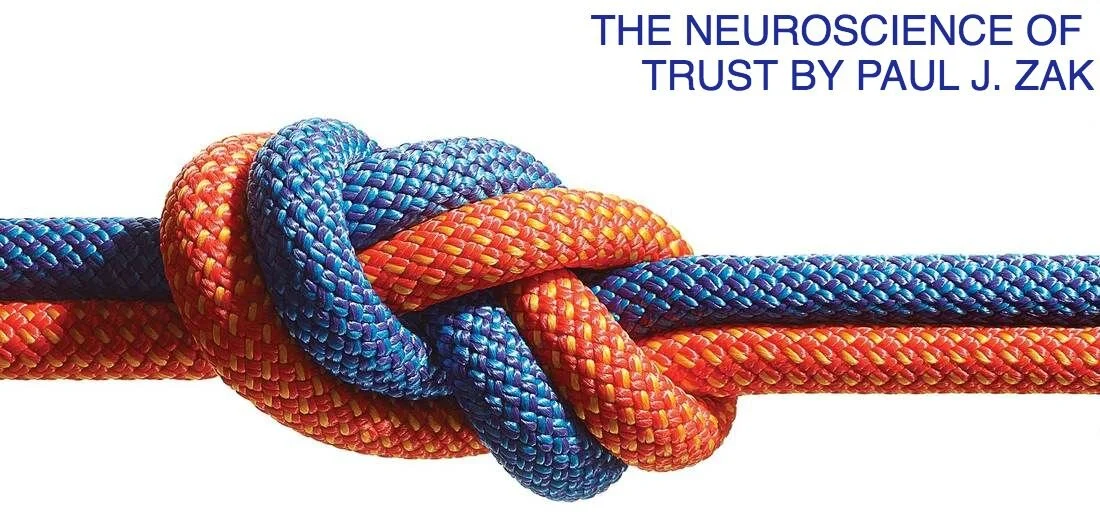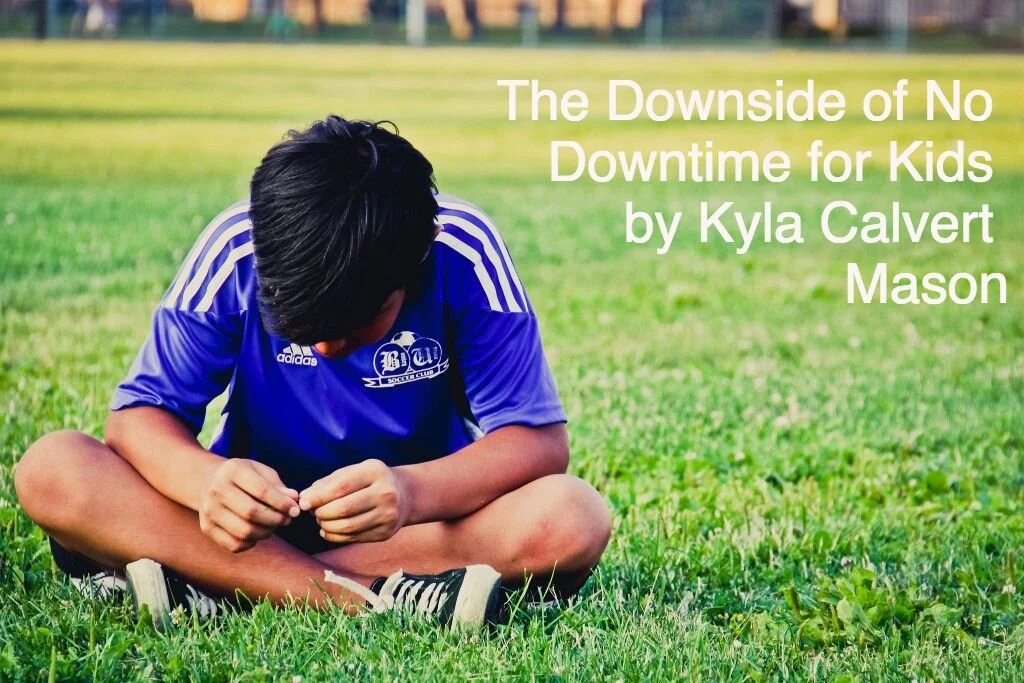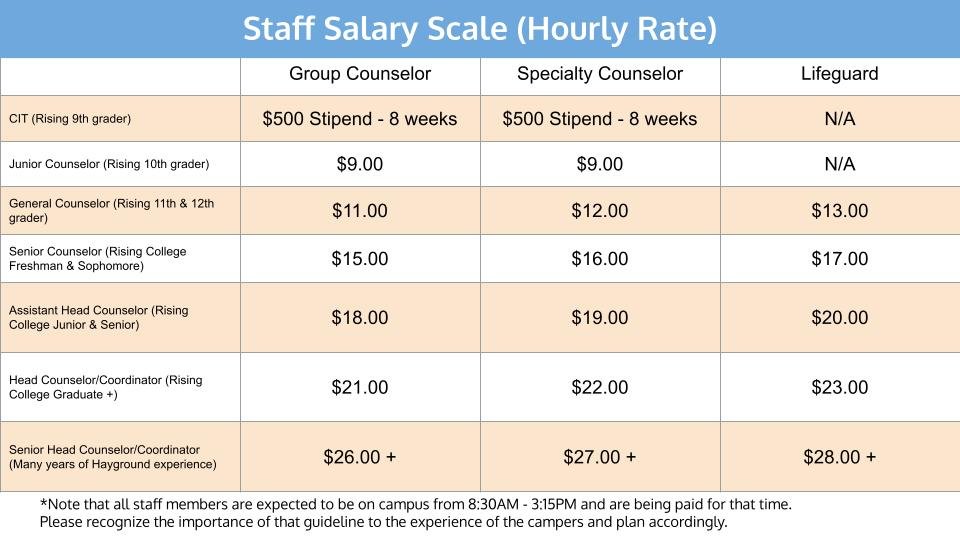Bonus’
There are a few ways in which you can supplement your income as a staff member and get paid beyond your base salary. As you saw above, lifeguards have their own salary scale. All of what we write about here (other than driving the vans) has already been taken into account for lifeguards.
$25 bonus per week for on-file up-to-date CPR/First Aid Certification
$50 bonus per week for on-file up-to-date Lifeguard Certification (note that you may be asked to lifeguard at any time)
$25 bonus per week for Upper Camp staff who have a driver’s license on file and are willing to drive the vans for beach and field trips (note that you get the bonus even if we don’t always need you to drive)
$50 bonus per week for any staff member who is running a program on their own without a team to lead (for instance, a Senior Counselor who is running our Social Media Team)
TIPS
Tips are not required. It is up to the discretion of each parent how he or she decides to tip if at all. Traditionally, parents give tips to all of the counselors in their child's group as well as some select Specialty Counselors based on the impact that Specialty Counselor had on their child, Tips should be appreciated and handled with discretion with the focus being on the positive experience of the camper. Any questions about tips should be brought to the Head Counselor.
HOW DO YOU THINK ABOUT RAISES AND PROMOTIONS?
14-year old CITs move up after one year. 15-year old Junior Counselors do, too. Once you reach General Counselor level, you may remain a General Counselor (or Senior Counselor or Assistant Head Counselor) for one, two or three years. If you have proven yourself to be an exceptional staff member, you may move up in one. If you are struggling to develop as a counselor, you may stay for three. Most move up after two years. A recommendation for moving up is made collaboratively by you and your Head Counselor. The final decision is made by senior staff. Note that staff member who do not work a full summer rarely move up in one year.
Generally, people move up the ranks based on years of Hayground experience. It is important to understand that we think of experience in three major ways: 1) Experience working with kids 2) Experience working at Hayground 3) Experience in the world. All three types of experience are valuable to us and factor into the decisions we make regarding raises and promotions. That is how an 18-year-old can, on occasion, rise to the ranks of Head Counselor. If she has been at Hayground since the age of three, we take that into consideration. No one knows Hayground better than a former camper with a few years of counselor experience.
If you do not start as a CIT, you are generally put at the level that equates to your school age. High School Juniors and Seniors start as General Counselors. College Freshman and Sophomores start as Senior Counselors.
SHOULD I EXPECT A RAISE EVERY YEAR? HOW DO PROMOTIONS WORK?
No. Raises are tied to promotions. So, as outlined above, if you remain a General Counselor for two or three years, you will make the same salary for those two or three years. We value development - those who show up and work and, in the process, try to get better at their jobs - over simply showing up. This can be a hard pill to swallow sometimes. But we believe that when you have earned your promotion, you'll feel as though you have truly earned it. And the money will follow.
We also hope that being an integrated part of a community such as Hayground where your development is taken seriously and where you get to make a difference in the lives of young people every day brings with it a great deal of bonus rewards that tap into that transcendent purpose. Everyone needs money. But don’t make the mistake of conflating pay with value.
WHAT ARE THE FACTORS BUILT INTO A PERFORMANCE-BASED DECISION?
We look at a few factors. As was mentioned in the Chain of Command section, we look for staff members with a wider field of vision. Staff members who do their job very well, but who take responsibility for the whole camp as their own. What does that mean in practical terms? If you see a paper bag in the Grove, do you pick it up or do you think about whether or not you need to? If you see a piece of gymnastics equipment on the basketball court, do you stop the game and get some help moving it to prevent injury (no matter how remote the possibility)? If you see a camper who seems disengaged, do you reach out to that camper even if he or she is not in your group? If you see something that could be changed about the schedule to enhance the experience of the campers, do you call attention to it and try to get it changed? That is what we mean by a wider field of vision. That is the number one factor in deciding who gets promoted.
After that, we look at your Journeys. Are you thinking deeply about your own strengths and weaknesses and working to improve yourself every day? Are you talking to your Head Counselors on a regular basis about your work?
We look at the way you handle yourself in Specialty Areas. When you go to Woodshop, do you find a way to participate or lay low? When you go to the Art Room, do you help with cleanup? When you go to music, do you sing and dance? Do you embody the joyful spirit of Hayground Camp?
Finally, we look at the relationships you build with staff and campers. Don’t mistake this to mean that the more friends you have the better an employee you are. A counselor who is able to connect deeply with a few kids who would have had a tough time without him or her is incredibly valuable to us. Take the time to build real relationships. Show your campers and your colleagues that you are there for them and that you appreciate the way they are there for you. We are always looking for these qualities, and you’d be surprised how easy they are to see.
HOW DO YOU GATHER THESE OBSERVATIONS?
We obviously cannot be everywhere at once. We notice a lot, but not everything. We rely on our Head Counselors to give us honest and fair feedback on the counselors who work with them. We are more interested in counselors who are working hard to grow than we are on counselors with “natural abilities” (if that even exists) who do not have a growth mindset. (See infographic below outlining the difference between a Fixed and a Growth Mindset.) We trust our Head Counselors to look for that, too.






